Central Asia’s Future Diplomats Trained in UN-Facilitated Regional Program in Ashgabat
16 May 2025
Ashgabat, Turkmenistan – 16 May 2025 – From 12 to 16 May 2025, the United Nations Resident Coordinator’s Office (RCO) in Turkmenistan, jointly with the Government of Turkmenistan, hosted an intensive regional training program for young diplomats from Central Asia in Ashgabat. The event, held at the Institute of International Relations under the Ministry of Foreign Affairs of Turkmenistan, brought together 20 promising diplomats aged 24–30 from Kazakhstan, Kyrgyz Republic, Tajikistan, Turkmenistan, and Uzbekistan.
Supported by the Embassies of Switzerland and Italy, and the United Nations Population Fund (UNFPA) in Turkmenistan, the training aimed to build the capacity of future leaders in diplomacy and foster regional cooperation. This initiative aligns with Turkmenistan’s commitment to nurturing young professionals and promoting peace, trust, and collaboration in Central Asia.
The opening ceremony featured remarks by high-level dignitaries, including Mr. Rashid Meredov, Deputy Chairman of the Cabinet of Ministers and Minister for Foreign Affairs of Turkmenistan; Mr. Kaha Imnadze, Special Representative of the UN Secretary-General (SRSG) for Central Asia; Mr. Luigi Ferrari, Ambassador of Italy to Turkmenistan; Mr. Dmitry Shlapachenko, UN Resident Coordinator (RC) in Turkmenistan; and Mr. Kemal Goshliyev, Head of UNFPA in Turkmenistan.
The five-day program featured thematic sessions and practical workshops covering the United Nations system, preventive diplomacy, gender and human rights, economic and demographic analysis, sustainable development, climate negotiations, public speaking, and diplomatic etiquette. Key sessions included simulation exercises on climate negotiations, conflict management, and political analysis.
This training was part of a broader initiative to implement the UN General Assembly resolution proclaiming 2025 as the International Year of Peace and Trust, adopted unanimously with the sponsorship of Turkmenistan and 86 member states.
"The investment in young diplomats today creates the foundation for a more cooperative and stable region tomorrow," said Mr. Shlapachenko during the opening remarks. “By learning and growing together, these future leaders are forging bonds that will shape the diplomacy of tomorrow.”
The first day of the program opened with the introduction to the UN system, led by Ms. Selbi Hanova, Head of the RCO in Turkmenistan, alongside Mr. Maksat Keshiyev, Partnerships Officer. Participants gained a deeper understanding of the UN’s history, structure, and its multifaceted mandates, as well as the roles of key bodies such as the General Assembly, Security Council, and Secretariat.
The session continued with the presentation by Mr. Kaha Imnadze, who guided participants through the core concepts of preventive diplomacy, conflict management and peacemaking in the international context - highlighting its significance in maintaining international peace and security.
Participants then explored the humanitarian principles and roles of the UN, as presented by Mr. Stephen O'Malley, RC in Kazakhstan, and Ms. Kavilmadam Ramaswami Parvathy, RC in Tajikistan. Their discussion emphasized the UN’s commitment to impartiality, neutrality, and independence in humanitarian action across diverse global contexts.
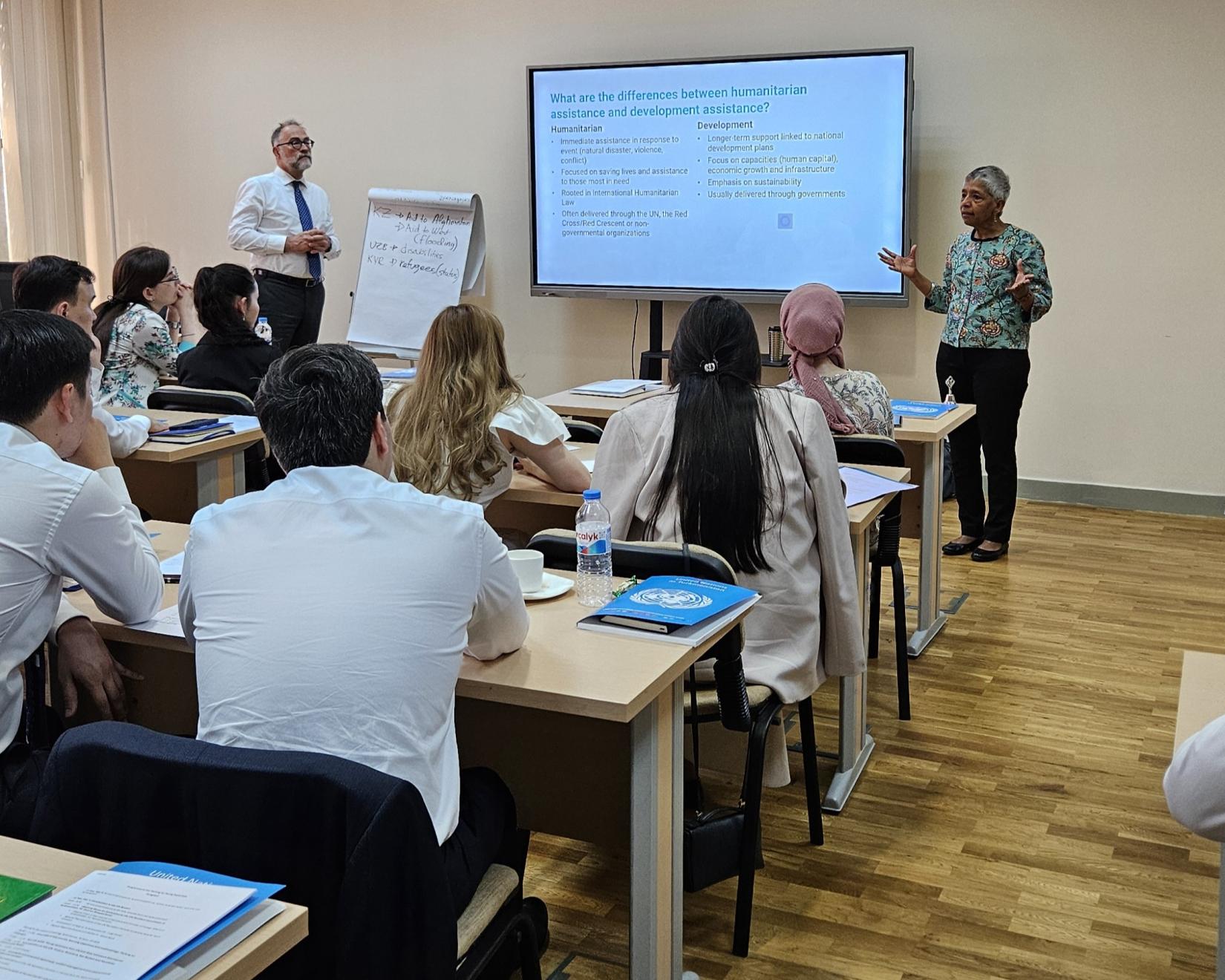
The day concluded with interactive exercises and group discussions, allowing participants to apply their newfound knowledge in simulated scenarios and deepen their understanding through collaborative learning. These dynamic elements set a strong foundation for the days to follow.
On the second day, the focus shifted to the United Nations' role in international development. Ms. Antje Grawe, RC in the Kyrgyz Republic, introduced participants to the Sustainable Development Goals and the broader context of the 2030 Agenda. She explained how these goals aim to improve lives around the world and why they matter for the future of Central Asia.
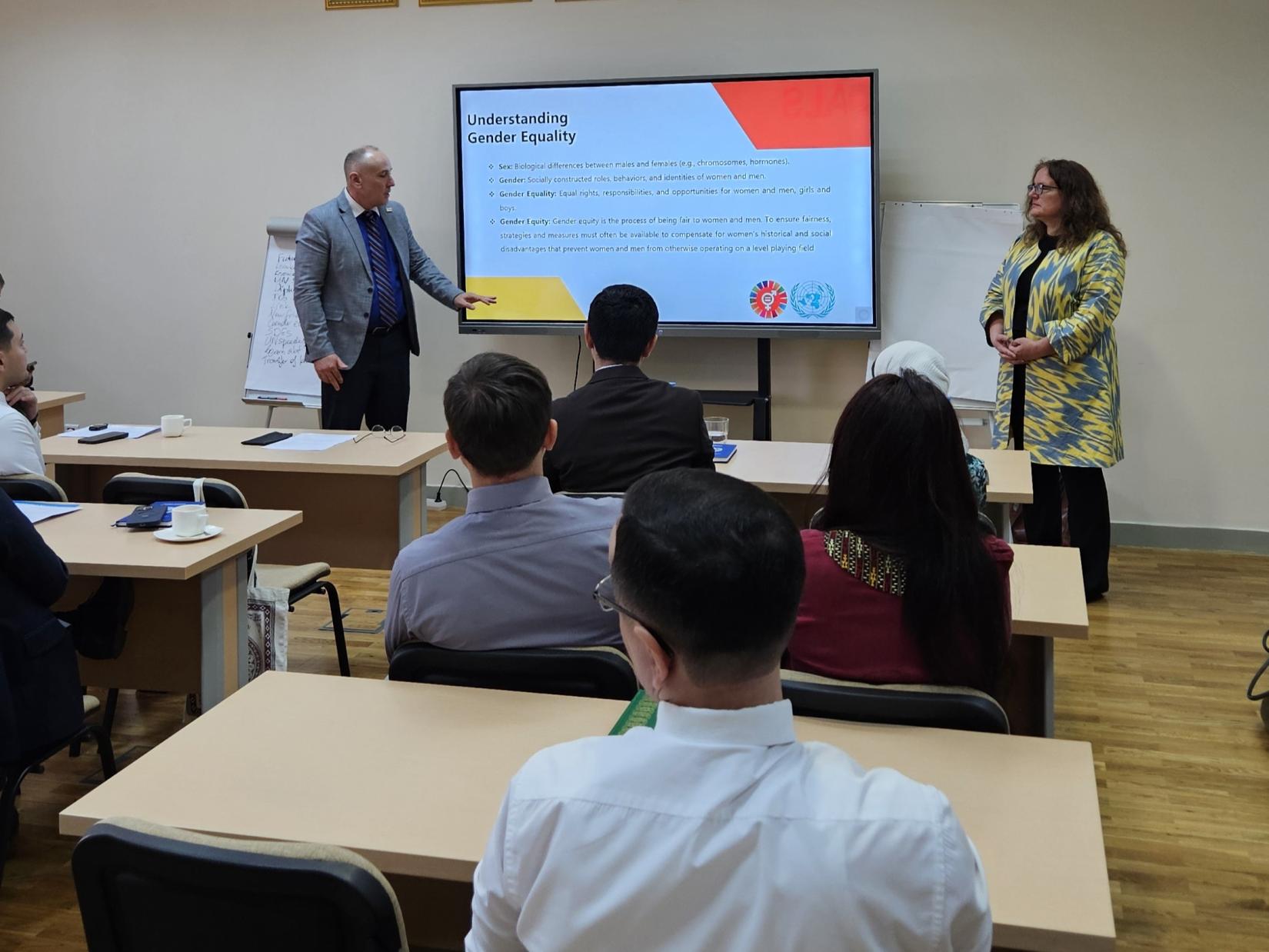
Ms. Sabine Machl, RC in Uzbekistan and Mr. Kemal Goshliyev, spoke about gender equality, sharing the UN’s principles and approaches to creating more inclusive societies. She encouraged an open discussion about how gender impacts development and diplomacy.
Later, Dmitry Petrin, Regional Cooperation Program Coordinator and CEWAP Program Manager at the World Bank in Kazakhstan =, led a session on water diplomacy. In a hands-on business game called “Canal Kush Tepe,” participants worked in teams to create an action plan for managing water resources across Central Asian countries. The exercise brought out creative ideas and challenged everyone to think like regional negotiators.
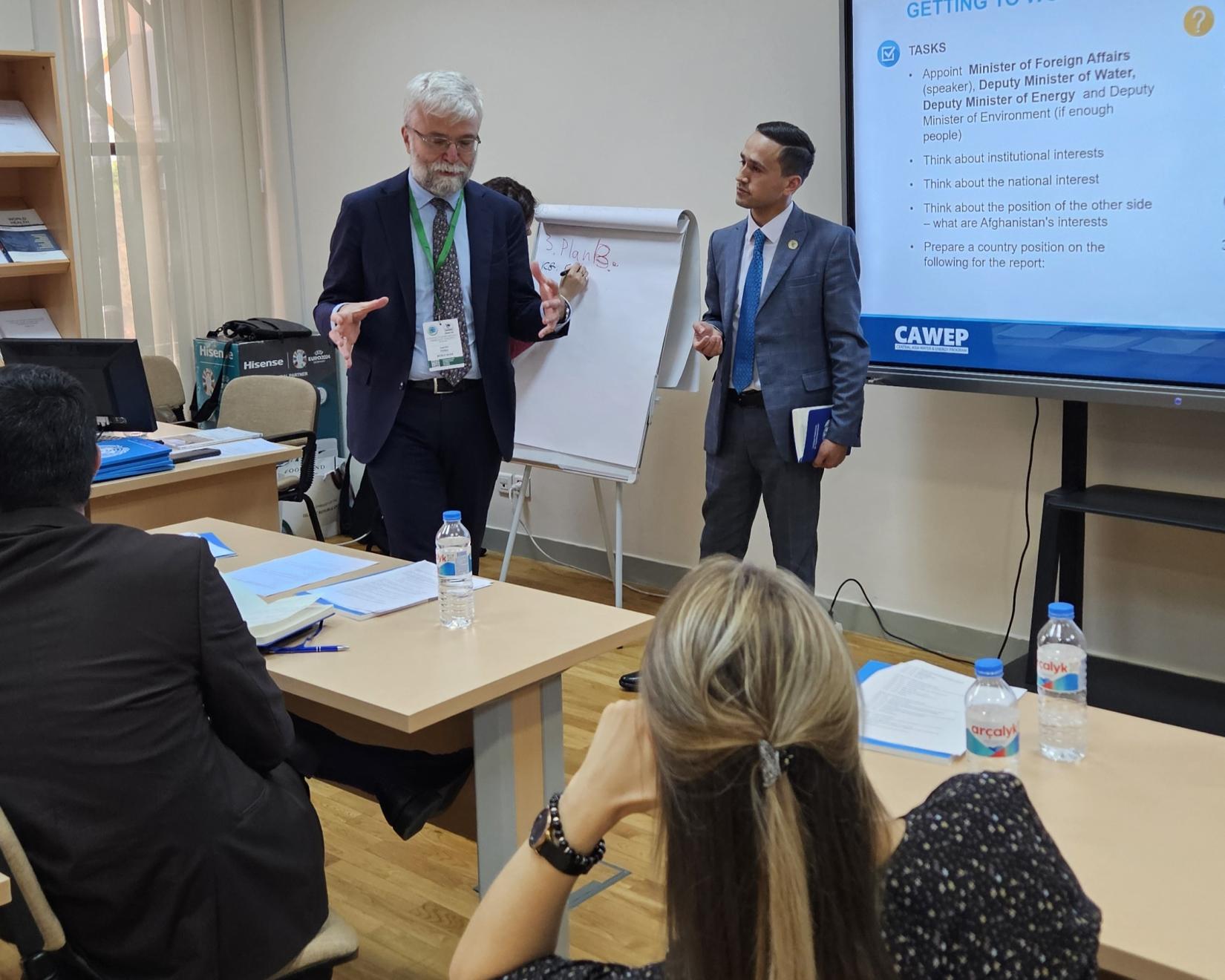
The third day was all about building key analytical skills for young diplomats. Mr. Artur Andrysiak, Country Director of the Asian Development Bank explained the basics of economic analysis and how understanding financial trends can support better decision-making in diplomacy.
Mr. Geldi Myradov, Data Management and Results Monitoring/Reporting officer RCO in Turkmenistan, spoke about the importance of using data in policy work. He showed how solid data can guide programs and help avoid mistakes, making diplomacy more effective and grounded.
Mr. Kemal Goshliyev wrapped up the day with a session on demography, explaining what population trends can tell us about future challenges and opportunities in the region. Throughout the day, participants practiced applying these tools through real-life scenarios, gaining experience in turning information into action.
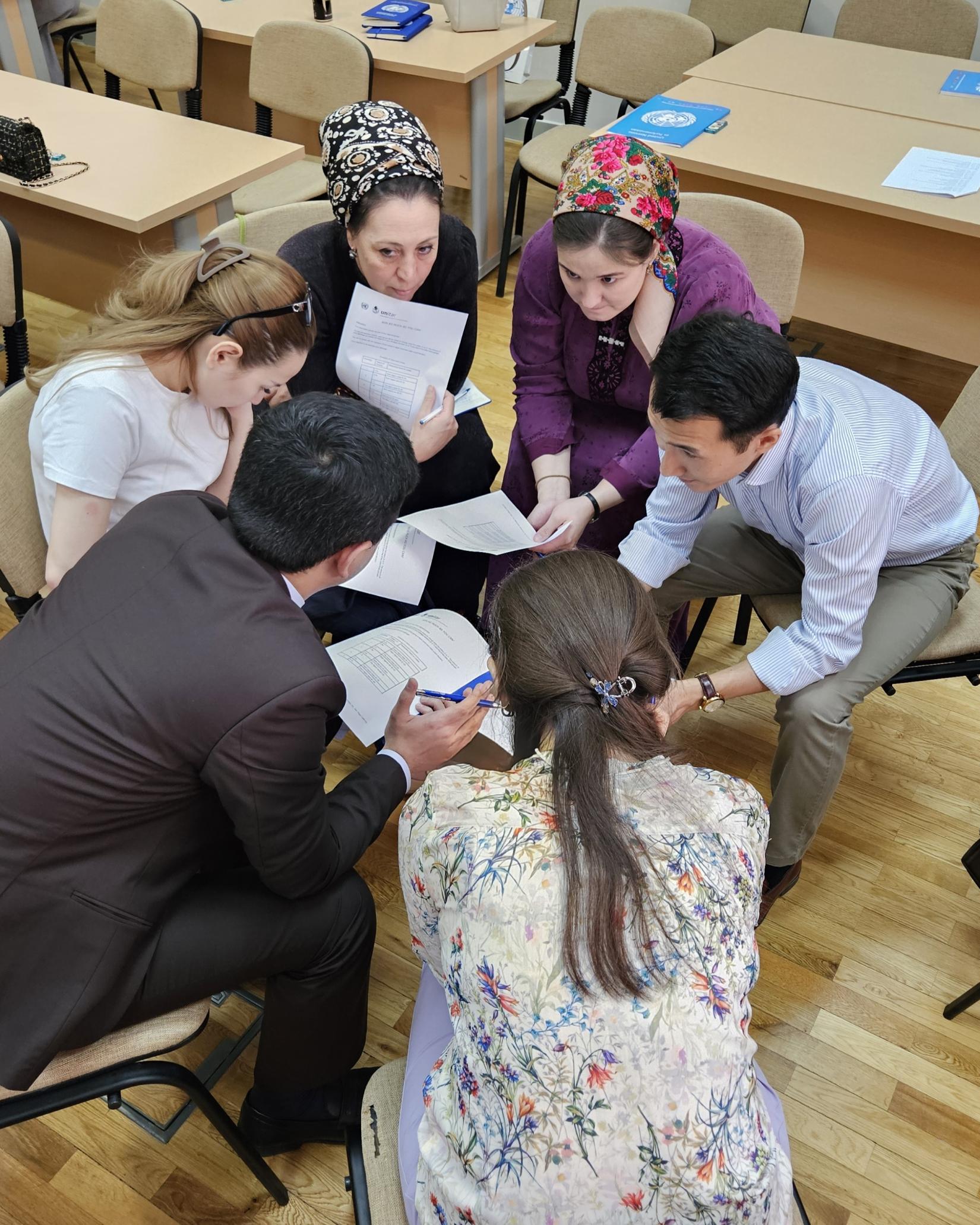
The fourth day focused on developing practical communication skills. Members of the UN Country Team in Turkmenistan shared their personal experiences working in the field. Mr. Dmitry Shlapachenko, RC in Turkmenistan, along with Ms. Narine Sahakyan (UNDP), Ms. Jalpa Ratna (UNICEF), and Mr. Egor Zaitsev (WHO), gave advice on public speaking, staying calm in tough situations, and how to communicate with impact.
The day continued with media training led by the UN Communications Group in Turkmenistan. Participants practiced how to handle interviews, deliver clear messages, and respond to challenging questions. Ms. Beata Peksa, the EU Ambassador to Turkmenistan, spoke about dealing with media manipulation and how to protect yourself from misinformation—an important topic in today’s digital world.
The day ended with a climate change negotiation simulation led by Ms. Maya Valcheva, Programme Officer, Green Development and Climate Change Division, UNITAR. Participants took on the roles of different countries, negotiating agreements and learning how climate policy is shaped. They also learned the basics of international law on climate change and how political analysis can help understand global issues.
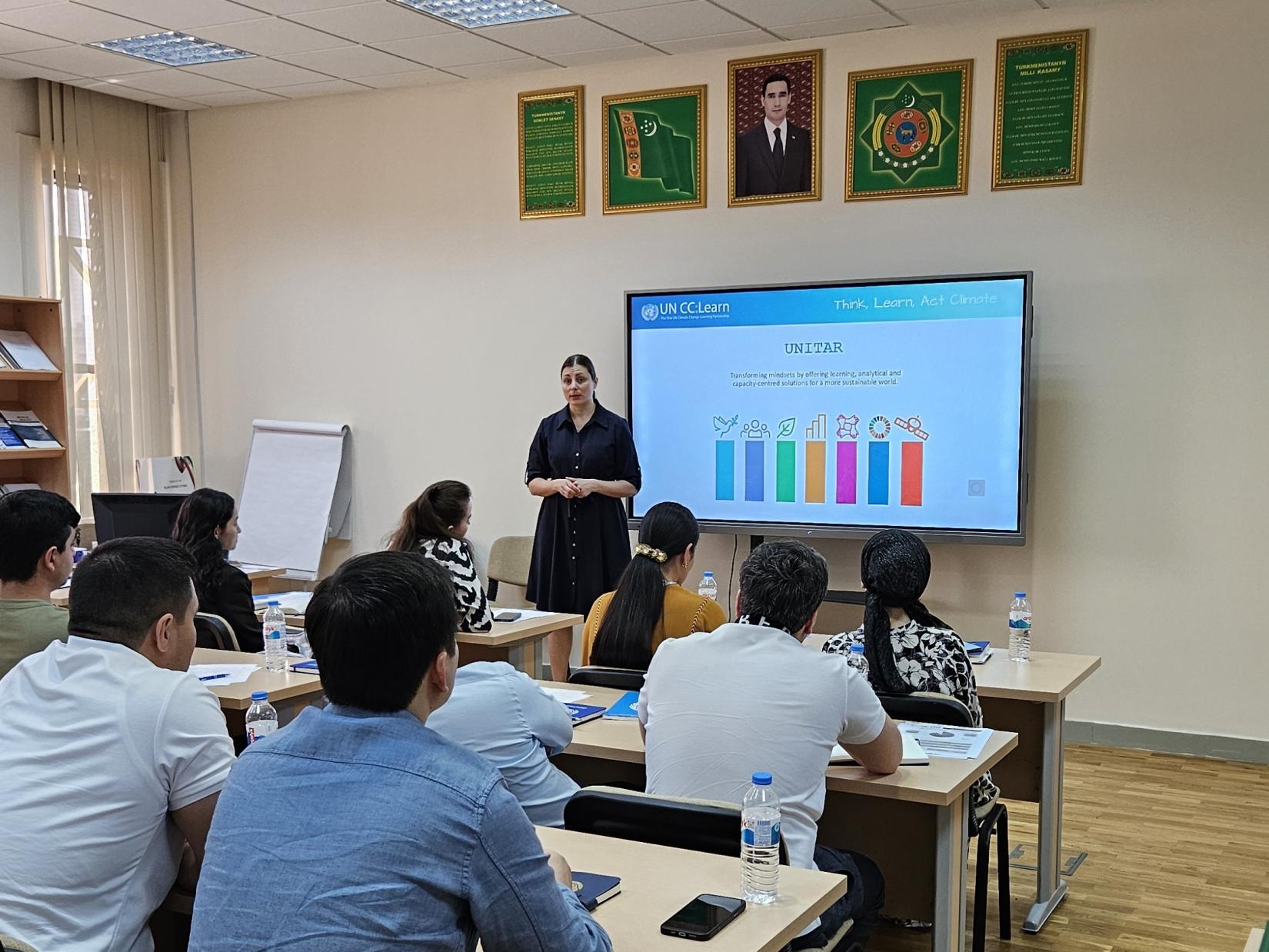
On the final day, participants explored key UN topics such as human rights, education, youth, and migration. Ms. Yelena Butova, National Programme Officer OHCHR in Turkmenistan introduced the history and principles behind the Universal Declaration of Human Rights, explaining the main UN bodies that protect these rights.
Ms. Jalpa Ratna and Mr. Kemal Goshliyev led a session on education and youth, showing how investing in children and young people is essential for sustainable development. Later, Mr. Timur Dosmamedov spoke about the link between migration and development, highlighting the importance of safe and fair migration policies.
The program closed with a special session on diplomatic etiquette and protocol, presented by Mr. Luigi Ferrari, Italian Ambassador to Turkmenistan, Mr. Dirk Jakobi, German Embassy, Mr. Kaha Imnadze, and Mr. Dmitry Shlapachenko. Speakers emphasized importance of protocol in the work of the diplomat and recalled challenges in their career experiences.
Participants then took part in an open discussion with senior diplomats from across Central Asia, sharing reflections and lessons learned. The week ended with a certificate ceremony, celebrating new friendships, shared experiences, and a growing network of future regional leaders.
The training successfully achieved its primary objectives: strengthening the diplomatic capacities of young professionals, enhancing their understanding of the United Nations system, and fostering regional ties across Central Asia. Through a blend of theoretical instruction, practical simulations, and peer-to-peer learning, participants gained valuable insights into diplomacy, international cooperation, and global challenges. Most importantly, the program built a strong network of emerging diplomats, laying the groundwork for future collaboration and mutual support in regional and international affairs.

















